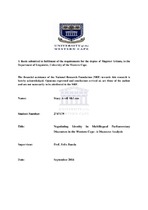| dc.description.abstract | South Africa transitioned from an apartheid system of government, with one ruling party to a new democracy; a transition that is still currently in progress. With this transition came many new freedoms, such as the ability to choose and freely express one’s linguistic and cultural preferences, amongst many others. This study analyses the negotiation of identity in constitutionally multilingual parliamentary discourses in the Western Cape in order to create a better understanding of the influence the new South Africa has on the identities constructed in parliamentary discourses whereby polylingualism is used as a linguistic resource. The parliamentary discourse is deemed constitutionally multilingual due to the fact that before 1994, African languages were not considered official, but presently Afrikaans, English and isiXhosa are credited provincial official languages in the Western Cape and are amongst the eleven national official languages. In order to investigate how performative identities are constructed discursively in the relatively new spaces of linguistic democracy, this study conducted a multisemiotic analysis on political manifestos in conjunction with a discourse analysis of a randomly selected Hansard Report of the Western Cape Provincial Parliament, which is the only parliament of the national nine to have an alternate political party in government. In collaboration with consulting the Standing Rules of the House, the National Language Policy Framework, the Western Cape Language Policy and observing the actual sitting, scholarly literature pertaining to language use, multisemiotic features and identity negotiation were evaluated to better understand the discursive spaces in which identity is negotiated as well as to achieve the objectives of this study. | en_US |

